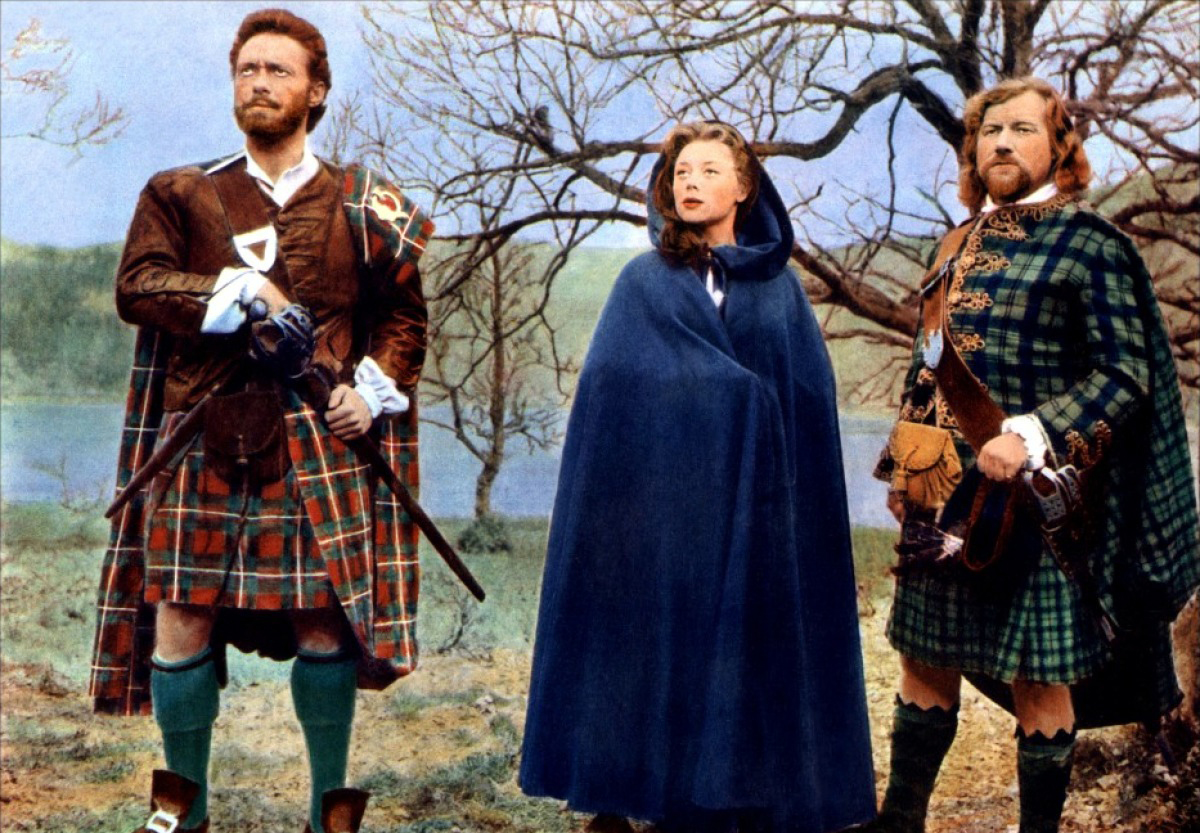The Men Who Would-Be ScotsMany non-Scots have portrayed Scots on stage and film - and with a varying degree of accent believability. And many Scots have played English men and women and Americans, etc. It's an actor's job of course to play someone you aren't. It isn't necessary to actually be someone else however. But, in the early days of film and even into it's supposed golden age, there were a few actors (English primarily), who actually made up a history for themselves AS Scottish born. Whether for a perceived publicity stance, or personal love of their long ago heritage, they went about their entire lives with completely fabricated stories of their origins. And when they did actually portray Scots in films - well, ironically they did it without much authenticity. In Hollywood in those early days, when it was very hard to figure out who was who and what was what regarding actors and their place in this new world, virtually everyone remade themselves, or had it done for them. Theda Bara for instance,... Silent Era Hollywood seemed like a much less dangerous version of the French Foreign Legion - you could reinvent yourself, forgot your name, forget your sordid (or quite ordinary) past, lost loves and lost fortunes and no one would care. It was a game they all played. There were Scottish actors to be sure plying their trade in a young Hollywood (Jimmy Finlayson, for example), and while not necessarily playing up their origins, never pretended to be English either - even if their accents seemed far more English than Scots once we heard some of them. English accents often passed for upper-class Boston accents in 1930's films oddly enough, and English actors usually played a variety of roles, not necessarily English, without bothering to affect an American accent. No one seemed to mind or pay much attention once they had gotten used to it. No one paid any head to Cary Grant's accent - he wasn't English as time went by - he was just, well, Cary Grant. In Miracle on 34th Street, Kris Kringle had an English accent, but no one thought he was English - just Santa Claus. However, I have a suspicion that if Barry Fitzgerald had played that part instead of Edmund Gwenn, people would have wondered why Santa was Irish. Most Irish actors who had reasonably "heavy" accents, almost always played someone clearly identified as being Irish - if not by origin, then by profession (police officer most often, or priest secondly). As with the Irish, I suppose in a Hollywood frame of mind, if you spoke with a Scottish accent you had to be playing a Scot in that part - which may be why most sublimated their accent as best they could - in order to get more work. Why was this? Well, I'm not sure - perhaps because it was less commonly heard, and the familiarity of English accents mostly faded into the background once a film got going. Irish and Scots accents, perhaps a bit harder for most Americans to understand was the cause of the toning down of some actors natural speech. There are many Scottish accents of course, but most non-Scots seem to go for a sort of a Scots brogue more reminiscent of Harry Lauter, who did much to propagate a sort of very distinctive Scottish caricature (though there had been plenty before) and language from his vast and vastly popular stage appearances. But accents and parts aside, there were three significant actors who claimed to be Scottish born and raised, though all three were English born. 
Donald Crisp was born in London, though he let it get around that he was actually from Perthshire. Scotland (Aberfeldy in particular). He also changed his name from George William Crisp. He fought in the Boer War, went to Oxford, and then hit the road (or high seas) for America. He soon ended up with D.W. Griffith's film troupe, playing a variety of roles and helping out behind the scenes as well - soon becoming a director himself. Perhaps his most famous role is at Battling Burrows in Griffith's classic film Broken Blossoms. He appeared in dozens and dozens of films as did most actors in those days - often only shot in one or two days (in his heyday Griffith as making 3 films a week - virtually every week). His first known film where he played a Scotsman was The Bonnie Brier Bush, followed closely by The Black Pirate - the Douglas Fairbanks color epic. Crisp's costume was a sort of stereotypical pirate and Scotsman rolled into one. These were silent of course. His first sound films playing Scotsmen were The Little Minister and Mary of Scotland. His supposedly native accent leaves quite a bit to be desired. It is slight to be sure, but still sounds false. His career rocketed however and was seen in numerous films and often in important parts, though almost exclusively in character parts. He won an Academy Award for Best Supporting Actor in John Ford's How Green Was My Valley - where his Welsh accent was a bit more successful. He made several Scotland based Lassie films - one of which, Challenge to Lassie was the tale of Greyfriar's Bobby, with Lassie substituted for the Skye Terrier of the tale. Here's a clip - Crisp appears as a Shepard selling sheep in Edinburgh where he comes across the pup. His accent to me sounds more Welsh than anything else. 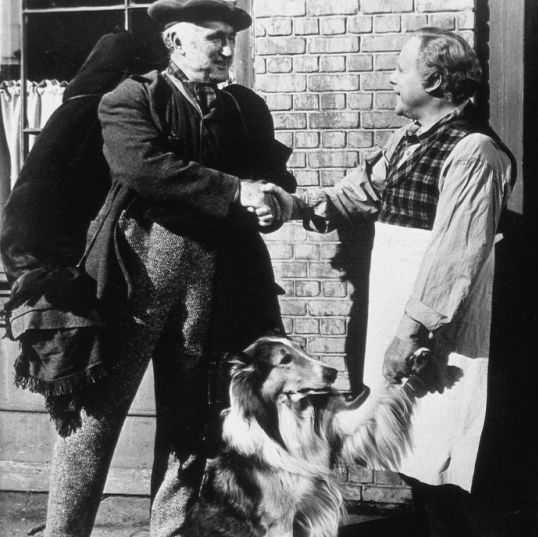 Crisp starred in Greyfriar's Bobby for Disney much later in his career, when they made that famous tale under its more commonly known title - and without Lassie. When the actor died in 1974, many obituaries passed on the story that he was Scottish - and it wasn't till much later (in fact, only recently) that it came out it was all a charade. Why did he do it? No one knows - not even if he actually did have some Scottish ancestors - perhaps as I have intimated above, it may have seemed a more exotic thing to profess to be, and in those heady "anything goes" days of Hollywood, it was easy to get away with. 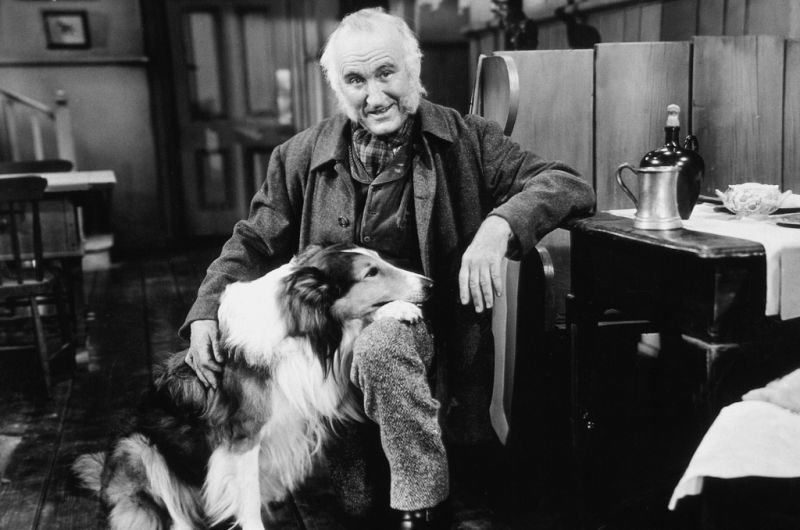
 James Robertson Justice was a slightly different kettle of fish however. His father was born in Aberdeen, but James was born in London, where he was raised. After some university education, he left for Germany, and then Canada, then back to England and then Germany again. He fought against the fascists in Spain, and when World War II erupted, he joined the British navy, and was invalided out due to an injury in battle. Apparently it was after the war that he decided to re-invent himself as a native born Scotsman - though could anyone have really believed, as he claimed, that he was born under a distillery on the Isle of Skye? Having clear Scottish roots, but not Highland/Island, and with a cultured and clear English accent, and with his tongue firmly in cheek, people bought into it just the same. His love for his father's country was so deep, that he actually became fluent in Scottish Gaelic (he had a clear knack for languages and spoke several quite well). In some films he was possibly listed under a Gaelic name, and not his English one. Most famous these days for a series of comedies based around the shenanigans at a hospital, the first and most well-know was called Doctor in the House, he did appear in the classic film Whisky Galore. He appeared as the Duke of Argyll in Disney's Rob Roy, The Highland Rogue and The Massacre of Glencoe. Here is a clip where we hear him speaking in what sounds to me anyway, as a Highland-English accent. Since at this point he did speak Gaelic, he certainly knew what the accent of native speakers was when they spoke English. The part to hear this accent starts at 6:08 At this point, the actor was living in Scotland, and he even ran for public office there, but wasn't elected. He was serious about his love for the country, and did everything he could to promote it. In the very first broadcast of Scottish Television in 1957, Justice was considered enough of a Scot to be the host of this remarkable show called This is Scotland. His accent, clearly English, but with a few words now and then in what seems to be a slightly affected Scottish lilt. With so many native Scots on hand for the broadcast, I'm sure he didn't want to over do it. Watch it all as it's quite fascinating on many levels. 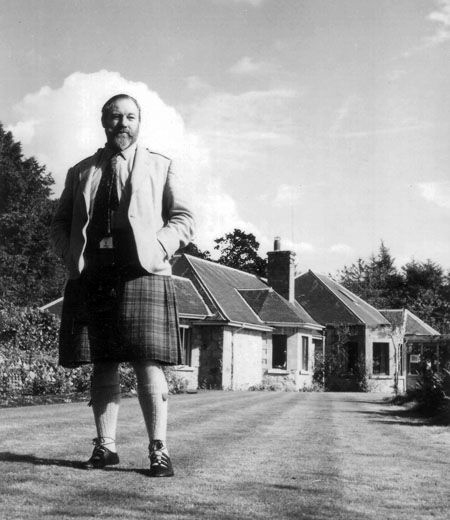 His last film is listed as The Massacre of Glencoe, and Justice as MacIan of Glencoe, is heard speaking a snippet of Scottish Gaelic (but mostly accented English throughout). Robertson seems a bit tired (or ill), and his accent not as cleanly pronounced as in his earlier Rob Roy. It's a pretty obscure film - a bit dry and deliberately paced, but a straight-forward re-enactment of the tragic events, and as such worth a look. When he died in 1975, the actor's ashes were brought to Scotland and buried close-by a former residence. 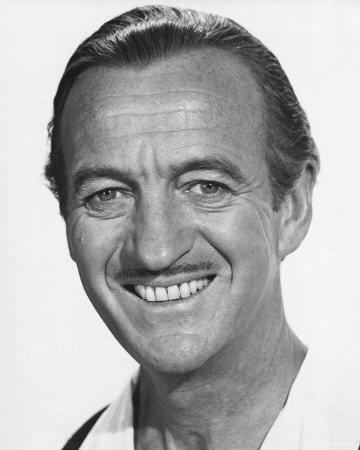
David Niven is the most famous of our would-be Scots. Born James David Graham Niven in London, he would also manufacture a Scottish birth for himself. Kirriemuir, in Angus, Scotland is not his birthplace - though he often claimed it. David's great-grandfather was Scottish however, and David did wish to serve in a Highland Regiment when he joined the army - and while the story may be apocryphal, he said wanted to join "...any regiment but the Highland Light Infantry" - which is exactly where he ended up. His main problem with them it seems is that they didn't wear the kilt, but tartan trews. Having an unhappy time of it, he may have actually bribed his way out of a military jail and high-tailed it over the ocean to New York, supposedly resigning his commission mid journey. Niven, being a great story-teller and not adverse to adding to any already improbable story, may be telling the truth - or, maybe not. In any event, he spun some great yarns, with absolute charm and conviction, and was a perfect personality for an actor to be. He soon ended up in Hollywood, and using his good looks, and charm, talked his way into a career. He was a fascinating screen personality and a fine actor within his scope. For a short while he shared a home with Errol Flynn, and their debauched adventures are Hollywood legend - and probably true. Their home was nick-named (by Niven) "Cirrhosis by the Sea" because of the huge amounts of spirits imbibed. Some of his early triumphs include: The Charge of the Light Brigade (1936); The Prisoner of Zenda (1937), and a good role in The Dawn Patrol (where he may be playing a Scot). 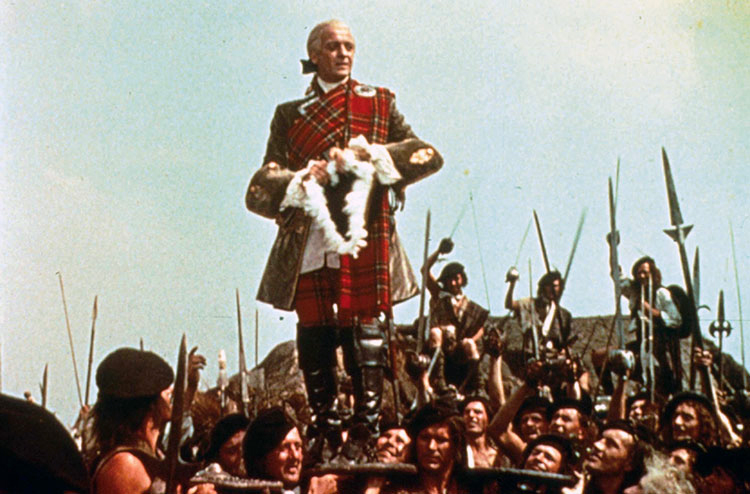 When World War II broke out he re-enlisted in the British Army, and was ultimately with the Commandos and stationed in Scotland. He earned many honors, and his service was nothing to be ashamed of. Back in the movies, he starred in the great film A Matter of Life and Death, by Powell and Pressburger, and The Bishop's Wife among many others. He won an Academy Award for his performance in Separate Tables. He continued to work steadily, enhancing his reputation and even had his own television series for a while - and was also one of the founders of the well known Four Start Television production company. He later starred in The Pink Panther (and two sequels), and even played James Bond in the 1967 spoof Casino Royale. His performances are engaging, welcoming, light and entertaining. Several books he authored about his life in Hollywood were also very well received and are in fact great reading - if not exactly the truth. 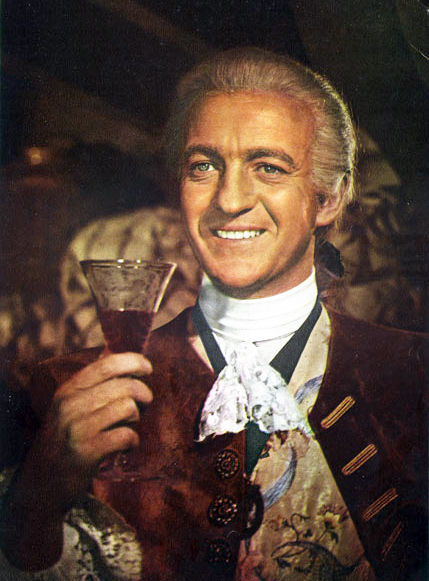 His only major role as a Scotsman was as probably the most famous of them - Bonnie Prince Charlie - in the film of the same name in 1948. The film was a huge epic - and a famous disaster. It cost far too much and delivered far too little. It is remembered as one of the great disasters of film in Britain and lost a fortune. He is too old to play Charlie and a rather obvious false nose doesn't help. The accent is not much different than the one Niven usually used, and since no one is quite sure what Charlie sounded like (given his odd upbringing), we'll have to give him a pass on that. It's not a very good film, even on reviewing - and a chunk of footage ended up in an Errol Flynn film in the fifties, The Master of Ballantrae. If you look close you can see Niven in the stock footage. He continued working up till the very end, even when his voice was destroyed by disease (he is in fact dubbed by Rich Little in the last of the Pink Panther films). David Niven was a much loved actor and personality - but no Scot, whatever his claim.
Crofting - PamphletThe pamphlet "Crofting?" was written by James Shaw Grant in 1967 with illustrations by M.E. Pullar Thompson. It was printed by Caithness Books, 1 Bank Street Thurso, Caithness and was published by An Comunn Gàidhealach with whose kind permission we publish it here. These pamphlets have been scanned and therefore are large image files. Click each link to read one page at a time First Known Recording of a Scottish AccentBack on April 15, 1885 Alexander Graham Bell used a Wax-and-cardboard disc to record his voice. This disc has been kept in the Smithsonian Museum for decades waiting for the day when technology would be able to pry it's audio secrets from it's dusty grooves. Using digital imaging engineers have been able to extract Bell's voice from this quite old and fragile recording. Basically they take a three dimensional picture of the audio information and using computer software translate that into audio. For more technical details feel free to light upon this page You can hear the results here: This is Alexander Graham Bell's transcript of his voice recording. Listen carefully and you Will be able to discern that Scottish accent! |
